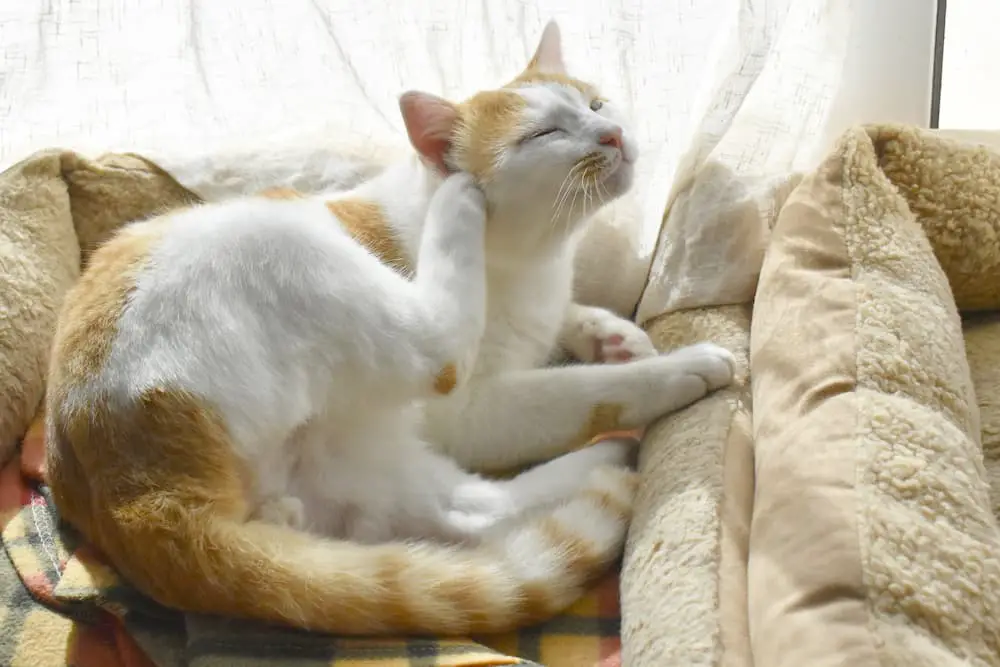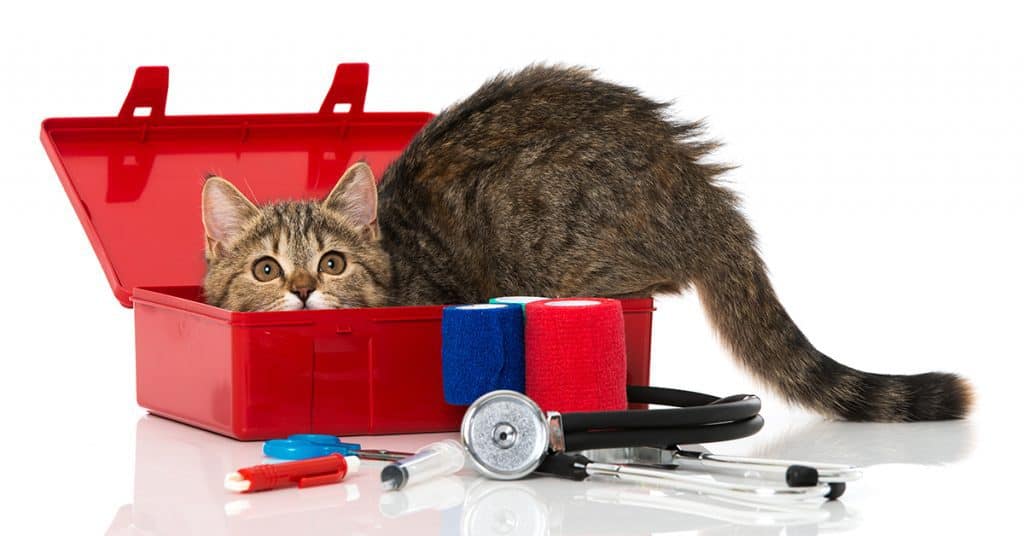
As Autumn approaches, so does the ragweed season, a time that can prove challenging not only for allergy-prone humans but also for our feline companions. Cats, like humans, can develop allergies to various environmental factors — and ragweed pollen is a common culprit. This article will guide you through identifying, managing, and preventing seasonal allergies in cats during this particular season.
Introduction
Seasonal allergies are a common yet often overlooked issue in our feline friends. Just like us, cats too can suffer from bouts of sneezing, itchy eyes, and general discomfort triggered by changes in the environment during different seasons. As cat lovers, it’s essential we are informed about these potential issues to ensure our furry companions remain happy and healthy all year round.
Understanding and effectively managing seasonal allergies in cats is crucial. These allergies can significantly impact a cat’s overall health, well-being, and quality of life. Unmanaged allergies could lead to skin infections, respiratory problems, or other complications. So, it’s up to us to recognize the signs, seek appropriate treatment, and, where possible, prevent these pesky seasonal allergies from affecting our beloved kitties.
Understanding Seasonal Allergies in Cats
Seasonal allergies in cats are primarily triggered by environmental factors that come and go with the changing seasons. The usual suspects include pollens from trees, grasses, and weeds, which can cause our feline friends considerable discomfort. Mold spores, another common trigger, typically increase during the damp, cooler seasons. Additionally, insect bites and stings, more common during warmer weather, can provoke an allergic reaction in our sensitive kitties.
Unlike year-round allergies, which are often caused by constant exposure to triggers like dust mites or certain foods, seasonal allergies come and go with the changing seasons. While your cat might be perfectly fine one season, the next might bring about a bout of sneezing and itching, all thanks to these periodic allergens.
It’s also important to know that, just like us, cats have immune systems that work hard to protect them from harmful substances. However, in the case of allergies, their immune system might overreact to otherwise harmless substances, treating them as threats and causing the symptoms we associate with allergies. Understanding this process can help us empathize with our feline friends and seek the appropriate measures to alleviate their discomfort.
Signs and Symptoms of Seasonal Allergies in Cats

Itchy skin in cats is a common symptom of seasonal allergies. Your feline friend may scratch excessively, causing redness or even sores. Animals experiencing this form of discomfort will often display a high level of restlessness, regularly disrupting their grooming or playtime for a scratch session. These signs are your cat’s way of telling you something is bothering them, and it might be those pesky seasonal allergens.
Sneezing and coughing, watery eyes, and ear infections also frequently occur during allergic reactions. These symptoms arise because the cat’s immune system is overreacting to substances it perceives as harmful. As it attempts to expel these ‘invaders,’ we see these classic signs of allergies emerge. It’s similar to the sneezing and watery eyes humans experience during allergy season.
Being in tune with your cat’s normal behavior and health can help you spot these changes early and seek timely treatment. Remember, our purring pals rely on us to understand and respond to their health needs. Being an informed and attentive cat parent is the first step towards ensuring your feline friend’s comfort and well-being during allergy season.
The Most Common Symptom of Seasonal Allergies in Cats
Dr. Julie Bradford is a veterinarian who specializes in dermatology. She’s also the Owner and Medical Director of GoodVets in Kansas City. She explained that while people with allergies often have runny noses or watery eyes, itchy skin is the most common symptom of allergies in cats. They will scratch, lick, and chew their skin which can then lead to skin lesions and infections. Symptoms include hair loss, red skin, scabs, crusts, and bumps. Lesions and hair loss can be located anywhere, but are often found on the face/neck, ears, belly, and sides.
“However,” she said, “the most common cause of itching in cats is fleas rather than seasonal allergies. Cats who are allergic to flea saliva become incredibly itchy. Fleas can hitch a ride into the house on our clothing or other pets, so even indoor cats should be on a high-quality flea control prescribed by a veterinarian.”
Dr. Bradford told us It is also possible for allergies to cause asthma in cats, which presents as difficulty breathing, wheezing, and/or coughing.
Diagnosis of Seasonal Allergies in Cats
Identifying seasonal allergies in cats begins with a detailed physical examination by a veterinarian. This process is crucial to evaluate the overall health of your feline companion and pinpoint specific symptoms that might indicate an allergic reaction. Veterinarians are well-equipped to spot the subtle signs of allergies that we might miss as pet parents.
In some cases, to definitively confirm the allergy, your vet may recommend allergy testing. This could include skin testing, where small amounts of potential allergens are introduced to your cat’s skin, or blood tests that measure the immune response to specific allergens. These methods provide a more precise understanding of what’s causing your kitty’s discomfort.
Throughout this process, it’s vital to rule out other potential causes of symptoms. Other health issues, such as infections or parasites could cause similar symptoms. Ensuring the correct diagnosis is key to providing your furball with the right treatment and relief from those pesky seasonal allergies. Remember, when it comes to our cats, it’s always better to be a curious cat parent!
Managing Seasonal Allergies in Cats
When it comes to treating seasonal allergies in your cat, there are several options that your vet might recommend. Antihistamines and corticosteroids, for instance, are commonly used to manage allergic reactions in our feline friends. These medications can help reduce the itchiness, redness, and discomfort that allergies can cause.
Allergen-specific immunotherapy, or allergy shots, are another potential treatment path. These injections work by gradually desensitizing your cat’s immune system to the allergens, helping to reduce the severity of allergic reactions over time. For skin allergies, topical treatments can provide much-needed relief, soothing irritation and inflammation at the source.
“Consider asking your primary care veterinarian for a referral to a veterinary dermatologist,” said Dr. Bradford. “Allergies are not curable and must be managed for the life of the cat.”
She further explained that Dermatologists can perform intradermal skin testing to determine an individual cat’s specific allergy triggers. This information can be used to create allergen-specific immunotherapy shots which can potentially decrease the need for other systemic treatments.
Regardless of the treatment method, always remember the importance of consulting with a vet to ensure the best care for your fur baby. Beyond the vet’s clinic, there are steps you can take to manage allergies at home, such as keeping your cat indoors during peak pollen seasons. The more we can do to reduce their exposure to allergens, the more comfortable and happier they’ll be. As cat parents, we must ensure our purring pals lead comfortable, itch-free lives!

Preventing Seasonal Allergies in Cats
Preventing seasonal allergies in cats can be a proactive approach to ensuring your feline friend’s comfort. Regular grooming and bathing can help keep allergens at bay, effectively removing any that might cling to your furry friend’s coat. Moreover, maintaining a clean, allergen-free environment is vital. Consider using air purifiers or filters to reduce the presence of potential triggers in your home. As cat lovers, we understand that safety and cleanliness are paramount to our feline friends’ happiness.
Additionally, regular vet check-ups and vaccinations are an essential part of preventative care. Regular visits can help spot any potential issues early on and allow for timely treatment. Remember, an ounce of prevention is worth a pound of cure! As cat parents, it’s our responsibility to ensure our purring pals are always in tip-top shape.
Here are Dr. Bradford’s Proactive Steps that pet owners can take to help prevent seasonal allergies in cats:
- Use high-quality flea and parasite control for all household pets to prevent added sources of itch
- While not as helpful for treating acute flare-ups, antihistamines and supplements like essential fatty acids are part of a multi-modal approach to managing allergies in the long term
- Topical treatments like special shampoos, sprays, and mousses can be beneficial for cats with seasonal allergies if they will tolerate them
Conclusion
In conclusion, caring for a cat with seasonal allergies is a task that requires vigilance and understanding. Remember, symptoms can range from excessive grooming and skin issues to respiratory distress and gastrointestinal problems. It’s crucial to stay attuned to any changes in your cat’s behavior and health, as these could be signs of an allergic reaction.
It’s our responsibility to ensure that our furry friends are comfortable and healthy, no matter the season. This can be achieved through a variety of methods, from regular grooming and a balanced diet to allergen reduction in the home, and of course, frequent veterinary check-ups.
Lastly, rest assured that your feline friend can lead a happy, healthy life with the right care and attention. After all, as devoted cat parents, nothing brings us more joy than seeing our purring companions content and comfortable.
The Catington Post is reader-supported. That means, if you make a purchase through links on our site, we may earn an affiliate commission. All images and names which are not the property of The Catington Post are the property of their respective owners.About Dr. Julie Bradford
Dr. Julie Bradford is the Owner and Medical Director of GoodVets Overland Park Leawood and GoodVets Prairie Village in Kansas City. She earned her DVM from Colorado State University’s School of Veterinary Medicine and Biomedical Sciences. Her special areas of interest in veterinary medicine include dermatology and endocrine disease. In her free time, she enjoys traveling, watching sports, and of course, spending time with her Pomeranian/husky mix rescues, Goose and Rooster.








